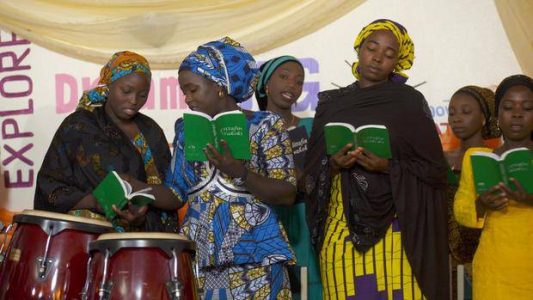
Survivors of kidnapping by Boko Haram terrorists share their stories
Imagine your teenage daughter was kidnapped while studying for her exams at school. And not just your daughter, but hundreds of girls in your town taken in the night. The families of Chibok, Nigeria lived through that nightmare almost five years ago when the Islamic terrorist group Boko Haram – whose name roughly translates to “western education is forbidden” – attacked a local school and ran off with 276 girls. Some escaped, but it took the Nigerian government three years to negotiate the release of fewer than half of them.
Since their release, the Chibok girls, as they’re known, have been largely hidden from the public. But we were able to meet with them at a kind of prep school to hear their remarkable story of survival.
The Chibok girls are all covered, chanting verses from the Quran.
They were facing a life of misery with beatings and starvation.
But now at the New Foundation School on the campus of the American University of Nigeria, the girls are singing again.
This time it’s the Christian songs they grew up with.
Rebecca: We are the Chibok girls that have been in captivities and now we are alive.
Getting out alive and singing hymns, things Rebecca feared might never happen.
Lesley Stahl: Did they let you sing when you were in captivity?
Rebecca: No. We are singing in private—
Lesley Stahl: Private.
Rebecca: They won’t allow us to sing like that.
Lesley Stahl: So you had to whisper sing?
Rebecca: Yes.
For Rebecca and her friends, just singing out loud today is a gift, after their three years of living in fear and pressure to become Muslims.
Lesley Stahl: So if you didn’t convert to Islam, were you punished for not converting?
Rebecca: Yes, they say if you didn’t convert to Islam you wouldn’t get home alive. That’s what they say.
Here are some of the girls two years ago right after they were released, alive but looking like concentration camp survivors, haunted and numb. This is Rebecca, skin and bones.
Lesley Stahl: I heard you were eating grass.
Rebecca: Yeah. Some of us eat that. And we are just be patient and live like that. No food. No anything.
Look at them today, in their 20s. They’re healthy and full of spirit at a school created just for them, paid for by the Nigerian government and some donors, where they are making up for lost time.
They’re from Northern Nigeria, where life can be hard and opportunities for women are limited. Now, in their Wi-Fi-equipped dorms, they have smart phones, and lap tops and their own beds.
They go back to Chibok to see their parents twice a year; over Christmas and during the summer.
Otherwise, they work hard here, going to class six days a week, studying subjects like biology and math. Working toward getting into the university, which would for them be free of charge.
Most of the girls we spoke to were shy. And reticent as they told us that their tight bond, going back to Chibok, helped them survive. When Grace’s leg was injured the night of the kidnapping, her “sisters,” as she calls them, Ayesha and Maryam and others pulled her through.
Grace: They are taking care of me. They are fetching water. They are washing me, my clothes, and everything.
Ayeisha: We are worried about her leg. We don’t have anybody there that will take care of her. Only us.
Lesley Stahl: You helped each other, sick, or unhappy, or scared, you were a unit.
Ayeisha: Yes.
Somiari Demm: They just had an unbelievable bond, and an attachment to each other.
Somiari Demm is the girls’ therapist, on call 24/7. Born in Nigeria, raised and educated in the states, she has been with this group since they arrived over a year ago.
Lesley Stahl: Can you tell us what their experiences were like generally?
Somiari Demm: Just a lot of the stuff, the starvation…
Lesley Stahl: They ate grass.
Somiari Demm: Eating grass, exactly, the beatings,– being forced to get married. At some point in time, you know, the bomb, the air strikes. So these are some of things that were reoccurring events.
Lesley Stahl: For three years.
Somiari Demm: For three years. Yeah.
Lesley Stahl: You were actually hit.
The air strikes started as the Nigerian government pursued and attacked Boko Haram.
Lesley Stahl: A bomb dropped where you were being held.
Rebecca: They mistakenly throw the bomb.
Lesley Stahl: And you were injured?
Rebecca: With some particles.
Lesley Stahl: Shrapnel?
Rebecca: Yeah and it’s still inside my body. It has not been removed.
Because the shrapnel is in her liver, she’s in pain. But she perserveres at school.
Lesley Stahl: You were kidnapped because you went to school. Now you’re back in school. Do you feel like you’re doing something courageous?
Rebecca: Even what happened with me will not stop me doing what I already desire in my mind.
Reginald Braggs, an American, has also been at the New Foundation School since its start.
A former naval officer turned college administrator, Braggs runs the school and designed the educational program.
Source: CBS News





